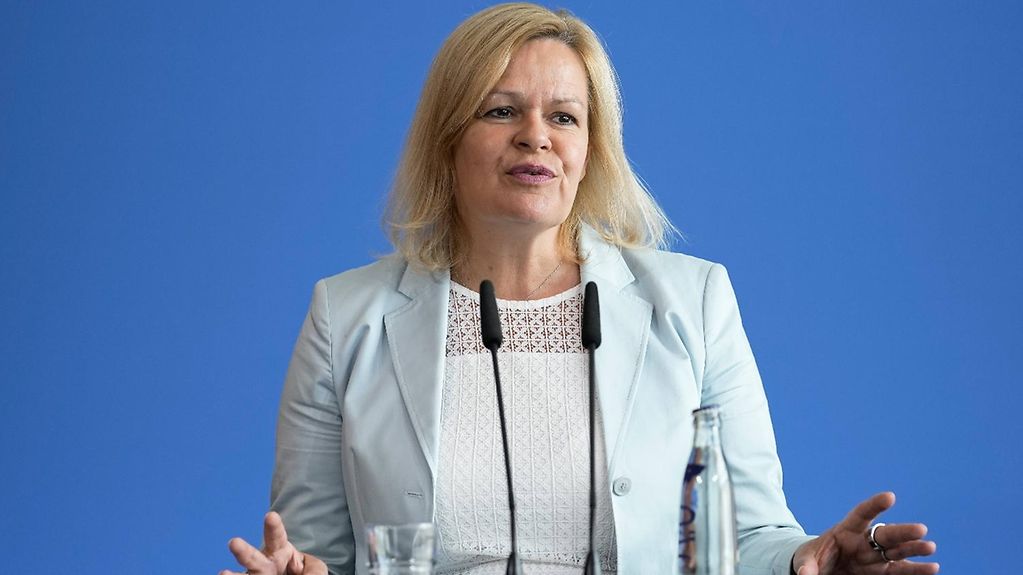Introduction of a new right of residence
A new right of residence offers a fair chance for those who are already well integrated in Germany. The previous practice of repeatedly granting exceptional leave to remain will be discontinued. Subject to certain conditions, refugees can now obtain a permanent right of residence.
4 min reading time

“We want people who are well integrated to have a fair chance of staying in our country, too,” said Federal Minister of the Interior Faeser , commenting on the Federal Government’s first migration package.
Photo: IMAGO/Political-Moments
The Federal Cabinet has approved the draft law on the introduction of a new right of residence. This is a first step by the Federal Government to initiate a fresh start in asylum, migration and integration policy, as well as undertaking a thorough modernisation of immigration law. The draft law introduces a one-year residence permit aimed at those who have possessed “tolerated” status for an extended period of time: they then have the chance to meet the necessary requirements to obtain a permanent right of residence in Germany. This will put an end to the previous practice of repeatedly granting exceptional leave to remain, which placed huge pressure both on the individuals concerned and the authorities.
Greater compassion in the granting of residential rights
Federal Minister of the Interior Nancy Faeser said: “This new right of residence opens up new prospects. We want people who are already well integrated to have a fair chance of staying. This is available to those who have already been in Germany for an extended period of time: the previous practice of repeatedly granting such individuals exceptional leave to remain is to be discontinued. This also puts an end to all the bureaucracy and uncertainty suffered by those who have already become part of our society. The new right of residence is not available to those who commit crimes or stubbornly refuse to provide information about their identity.”
The Federal Government Commissioner for Migration, Refugees and Integration and Commissioner for Anti-Racism, Minister of State Reem Alabali-Radovan, emphasised: “For the people concerned, the new legislation provides a gateway to a better life in Germany: it reflects greater compassion rather than mistrust. In this way, we’re finally offering fair prospects to those who have already been living in this country for more than five years. They have ‘tolerated’ status, yet they want to contribute and provide for themselves and their family, to live in safety and without fear of deportation.”
Who does the new regulation apply to?
The new regulations affect around 136,000 people who are already well integrated in Germany, who have lived in the country for at least five years as of 1 January 2022 and who hold a tolerated stay or temporary residence permit. They may not have a criminal record and must commit to the free democratic basic order. Well-integrated adolescents and young people up to the age of 27 can be granted a residence permit after three years of residence.
What does the law specifically say?
The individuals concerned are granted a one-year right of residence. During this time, they have a fair chance to meet the requirements to obtain a permanent right of residence in Germany. These include showing proof of earning a livelihood through gainful employment, demonstrating a good level of proficiency in German and providing proof of identity.
Can offenders and dangerous persons also benefit from the scheme?
No. It is a priority for the Federal Government to be more consistent than before in enforcing the repatriation of people who cannot stay in our country. Criminals and dangerous persons remain excluded from the new one-year right of residence. For this group, expulsion and the ordering of detention pending deportation will be facilitated. Further, those who continue to hinder their deportation by means of repeated, deliberate false statements or active identity fraud will be denied a residence permit; in such cases, speedy repatriation will be consistently enforced instead.
Does the law also include provisions regarding the recruitment of foreign skilled workers?
Yes. In order to increase the appeal of our country as a place for foreign skilled workers to come and live, those provisions that were only put into effect for a limited period of time in the Skilled Workers Immigration Act will become permanently applicable. In addition, family reunification will be facilitated for third-country nationals in that spouses joining them at a later stage will not be required to demonstrate language proficiency.
Will there be faster access to integration courses in the future?
The Federal Government will open up integration courses for asylum seekers right from the start. In future, integration courses and vocational language courses will be fully accessible – depending on availability – irrespective of the country of origin or date of entry of those concerned. In this way, the Federal Government aims to contribute to participation and social cohesion.
A look ahead to other projects contained in the coalition agreement
The Federal Government will also swiftly tackle other asylum and migration policy projects contained in the coalition agreement. This will also involve the introduction of more legislative packages this year and next to modernise immigration law.